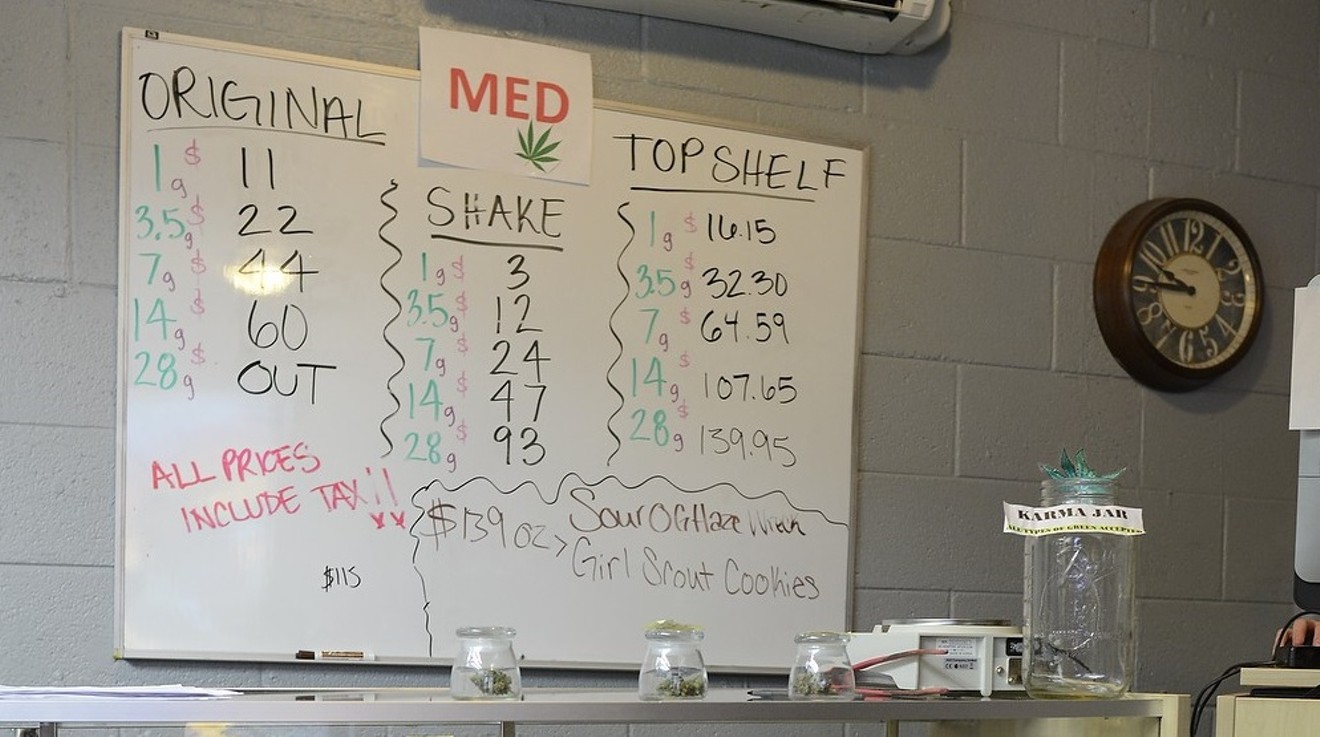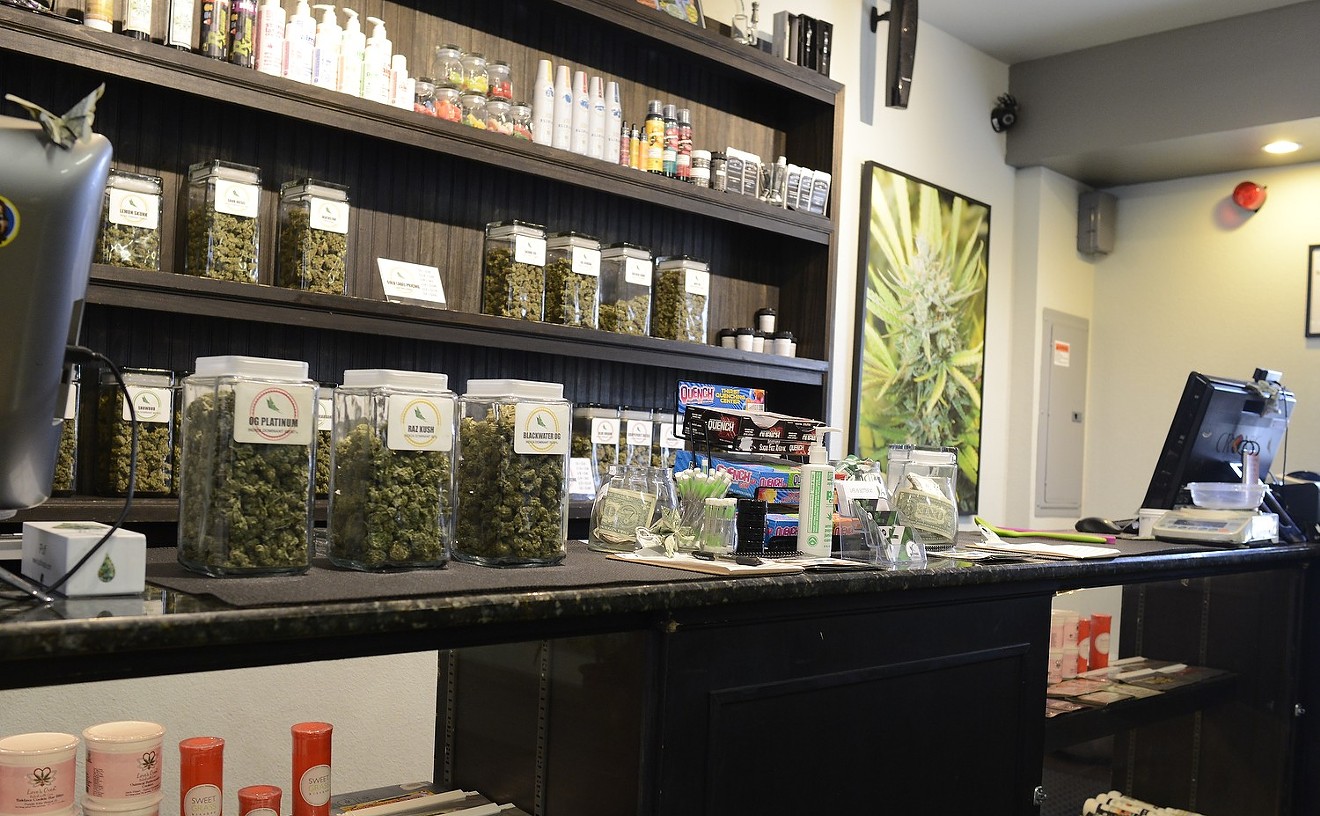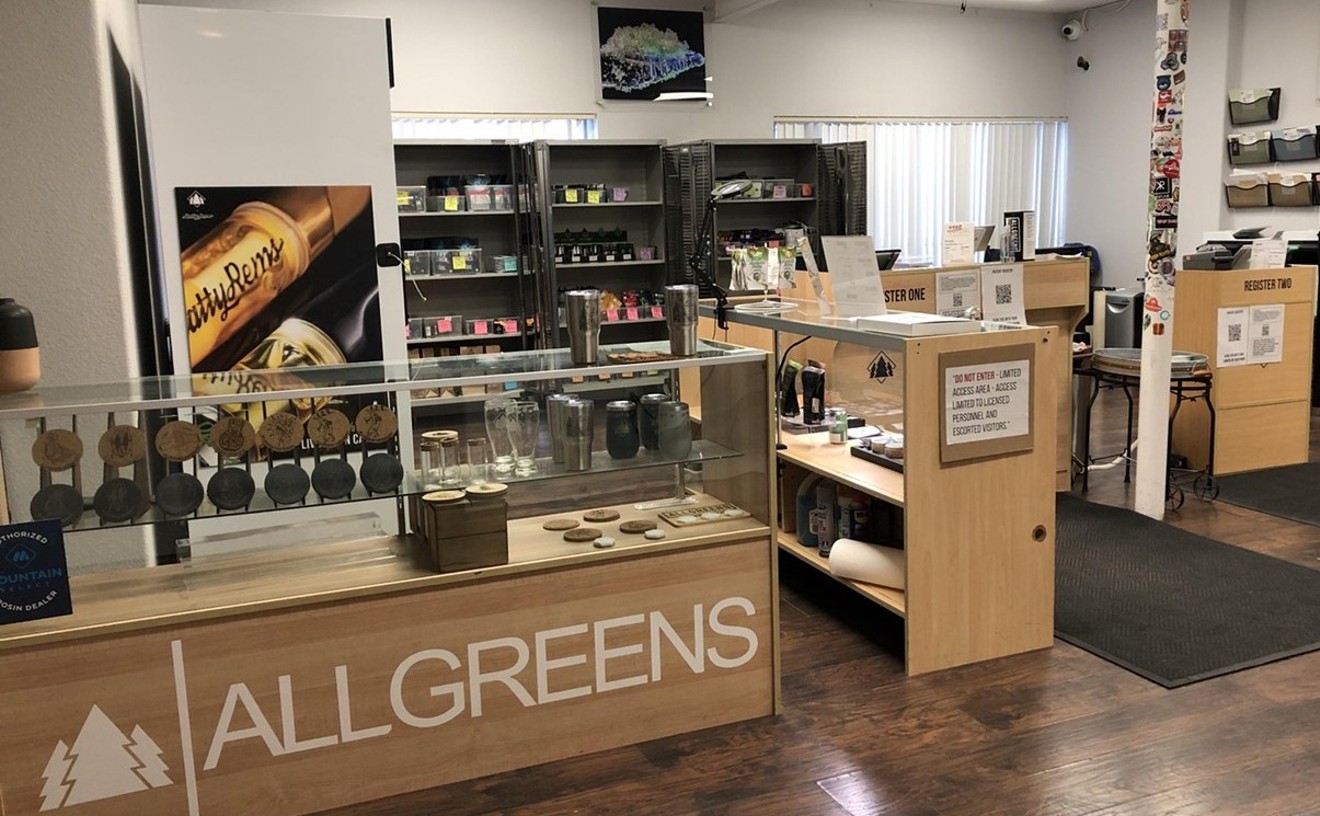"I was used to getting $10 eighths [of an ounce]. Now they're $15 and $20," he says. "This is supposed to be medicine, right?"
After medical marijuana patients are approved by the state, they have three options for obtaining their medicine: They can grow it at home, designate a private caregiver to grow their plants for them, or buy it from a dispensary. From the start of the program, they could designate a medical marijuana dispensary as their caregiver, and dispensaries provided many perks and discounts in exchange.
A standard medical marijuana patient in Colorado is allotted six plants per home grow or caregiver. So for every patient who designated a dispensary as their caregiver, that meant six more plants in that store's grow. If a patient with an extreme medical condition was approved by a doctor for an extended plant count, the designated dispensary could grow even more on the patient's behalf. Since the use and sale of cannabis products produced from those plants was not restricted to a particular patient, however, many dispensaries competed to become caregivers, offering deals in exchange for the chance to have a larger overall inventory.
The plant-count provision was part of a vertical-integration rule that required medical dispensaries to grow at least half of the cannabis they sold. However, vertical integration expired for medical dispensaries on July 1, and the number of plants at their supplying grows is no longer tied to the number of patients that designate dispensaries as their caregivers.
As over 90 percent of the state's 83,984 registered medical marijuana patients designate a dispensary to grow their plants, according to the state medical marijuana registry, the rule change could affect tens of thousands of patients as dispensaries reconsider their supplies and prices.
"Since medical vertical integration went away on July 1 and cultivations can grow the max plants allowed and are not depending on patient plant count, there simply isn't any incentive for dispensaries to provide [those] deals," explains Tim Morgen, community relations manager for dispensary chain Bgood.
While Morgen says Bgood will continue honoring member deals and benefits, he notes that it will "soon be changing" to a price structure that no longer involves a membership. Other dispensaries, such as Denver Kush Club, have eliminated their patient membership structure entirely; Denver Kush says it is updating prices "to accommodate" patient needs.
Now that dispensaries don't need patients to register with them in order to grow more plants, the competition to sign up patients — as well as the freebies, discounts and access to limited products that came with that competition — has died down. That frustrates patients like Conway, who consume more cannabis than do most recreational consumers and are used to cheaper base prices.
Not everyone in the patient community thinks the market change is necessarily bad, though.
Mary Carneliga, a medical marijuana activist and patient who works with several cannabis nonprofits, has been shopping at medical dispensaries since before recreational pot was legalized in Colorado in late 2012. She recalls how back in 2010, a doctor could post up in a dispensary waiting room and quickly (and cheaply) approve visitors for medical marijuana cards, as long as they signed over their caregiver rights to the dispensary.
"These stores were clamoring for patients to sign over their plants, and they'd offer discounts and all of these other convenient benefits, but that also created some nefarious practices to get patients. You could see how that would be an attractive idea," she remembers. "This was before the state cracked down on doctors issuing plant counts of 24 or 34. Now the dispensaries can have as large a grow as they want."
Policy updates from the state Marijuana Enforcement Division and Colorado Department of Public Health and Environment banned dispensary waiting-room doctors and tightened the standard for extended plant counts years ago, but caregiver designations continued to play a large role in medical cultivation capacity until July 1.
Although Carneliga says she'll watch for unexpected consequences, she's optimistic that the rule change will make operating medical dispensaries easier and bring cheaper base prices for patients as a result. "I think dispensaries will still want your loyalty. It just may change a little bit," she predicts.
The rule change has already led to more opportunities for wholesale cannabis suppliers, as well as a brief shortage in medical marijuana as some dispensaries readied their shelves for third-party products. Patients report that Denver dispensaries Fox Cannabis, Lit, Standing Akimbo and the Stash House all had limited medical marijuana supplies in early July.
"The medical market has experienced an extreme shortage on product in the months leading into July, as a lot of grows have not been able to wholesale their entire inventory without violating the 50/50 vertical integration rule," Morgen explains. "So it's been really difficult finding products on the market, which in turn has led to increased prices and a lack of deals."
But membership deals and cannabis discounts haven't been outlawed, according to the MED. Although they're no longer the recruiting tool they once were, medical dispensary owners can still use them to strengthen customer relationships.

Denver dispensary Lush says it will still have a membership program for registered patients.
Thomas Mitchell
Lush co-owner Cynthia Andersen, who runs her small, medical-only dispensary and grow in Denver with her son and her husband, says that there have been so many changes in regulations that it's hard for businesses owners to anticipate them. But this latest update won't affect the supplier, she says, nor will it affect patients at her store.
"We have such a hard time keeping track of what applies to us and what affects our businesses," Andersen says. "This [change] doesn't make any difference to us as a medical center and grow, but we still want to caregive for people, if that's still the proper term in this industry. We still want people to be our members, which means they'll get a little discount in price."












